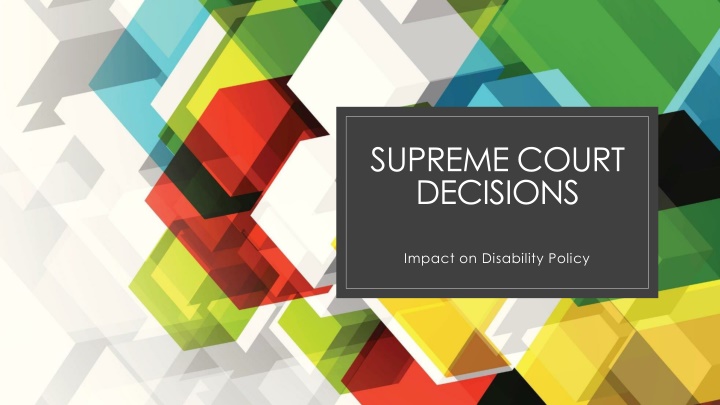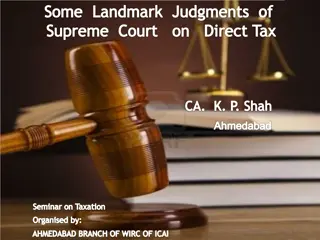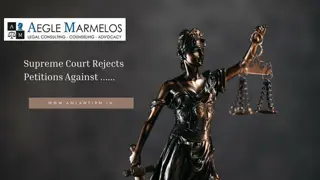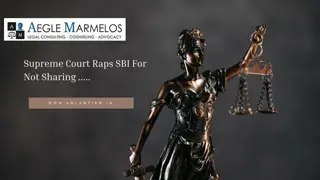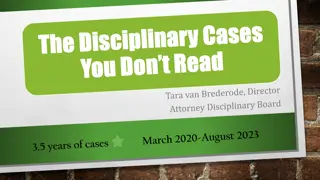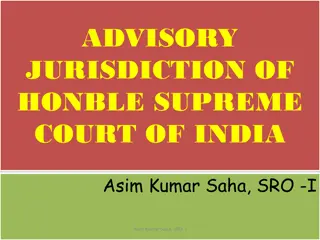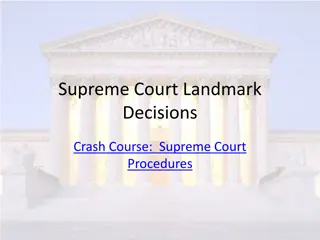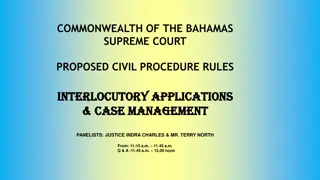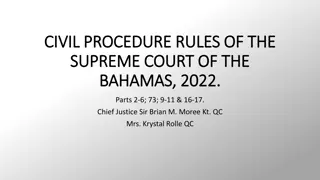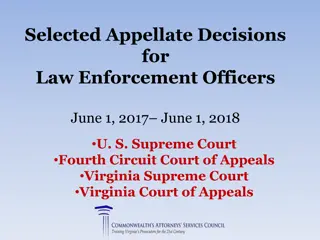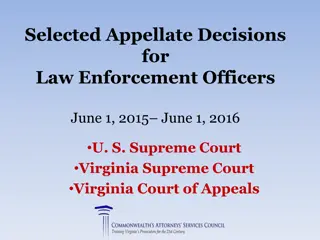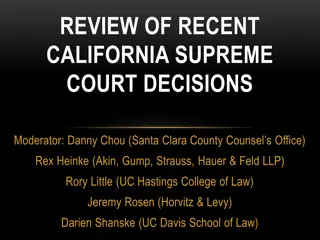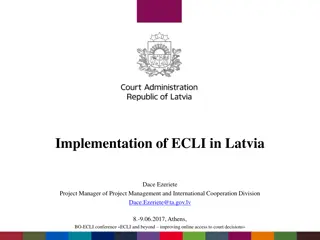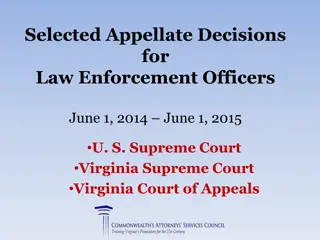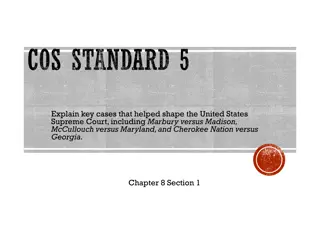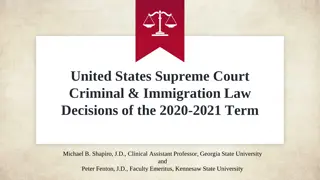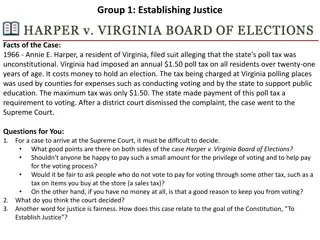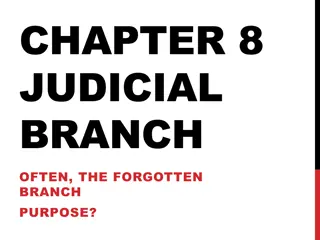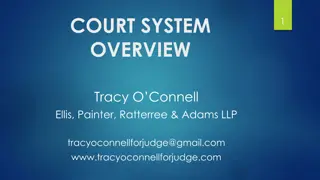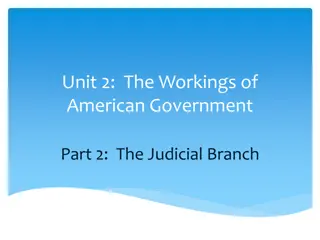SUPREME COURT DECISIONS
The recent Wisconsin Supreme Court ruling on absentee ballot boxes impacts voters, particularly those with disabilities. While unstaffed ballot boxes are banned, it remains unclear if staffed ballot boxes are allowed. Federal laws protect voters with disabilities, ensuring their right to assistance in mailing their ballots. National disability advocates express concerns over potential implications of recent legal decisions on voting rights and autonomy. Learn how these decisions may affect voters with disabilities and the broader legal landscape.
Download Presentation

Please find below an Image/Link to download the presentation.
The content on the website is provided AS IS for your information and personal use only. It may not be sold, licensed, or shared on other websites without obtaining consent from the author.If you encounter any issues during the download, it is possible that the publisher has removed the file from their server.
You are allowed to download the files provided on this website for personal or commercial use, subject to the condition that they are used lawfully. All files are the property of their respective owners.
The content on the website is provided AS IS for your information and personal use only. It may not be sold, licensed, or shared on other websites without obtaining consent from the author.
E N D
Presentation Transcript
SUPREME COURT DECISIONS Impact on Disability Policy
WISCONSIN SUPREME COURT Ruling on Absentee Ballot boxes
Ruling on Absentee Ballot boxes Ruling bans the use of unstaffed ballot boxes. Unclear if staffed ballot boxes are allowed Wisconsin s court did not rule on whether a voter may receive assistance with mailing their completed absentee ballot. Federal law protects voters with disabilities to have assistance from the person of their choice. Wheeler Report analysis found about ~20 percent of voters use absentee ballots every election.
What does it mean for voters with disabilities? Wisconsin s Supreme Court decision did not change federal laws that protect the rights of voters with disabilities (Voting Rights Act, Americans with Disabilities Act. ) to have assistance mailing their ballot, and to have a person of their choice deliver their ballot to their clerk or polling place. If a voter with a disability needs someone else to mail their ballot, they should feel comfortable doing so. If a voter with a disability needs assistance with ballot delivery, contact their clerk and ask for a disability related accommodation. Find your clerk at: My Municipal Clerk (wi.gov) DRW is developing a sample accommodation request. When available. it will be posted on our website Questions? Contact the Disability Rights Wisconsin Voter Hotline: 844-347-8683/ info@disabilityvote.org
U.S. SUPREME COURT Three decisions to watch
Dobbs v. Jackson Womens Health Organization Overturned the constitutional right to abortion established by Roe v. Wade in 1973. States will now set their own policies on these and other related reproductive issues. Many states may pass additional legislation or interpret their existing laws through the state courts. The landscape of law to keep shifting on this issue, as will the unintended consequences. There will likely be implications for state budgets and programs depending on the policies states set.
How national disability advocates see decision This decision selects a group (women, transgender men) and a type of decision they are not allowed to make. It widens the scope of who else must give permission or approve of any narrow exceptions. This logic could be applied to other issues important to PWD, including voting rights and whether states must provide community living options. Guardianship which many people with I/DD are subject to is based on the idea that some people should not have the same civil legal rights to make their own decisions. This system can be easily abused. PWD have fought hard for bodily autonomy. They have never fully won it.
West Virginia vrs. EPA This case was not directly related to disability policy. It is a sign of how the court thinks about federal agencies making rules that all states must follow. The court said any time an agency does something big and new they can t make rules unless Congress has specifically said it is a topic the agency is allowed to regulate. Congress can direct agencies to make rules when they pass laws, but they can t always know what is needed when they pass the bill. This ruling means if Congress doesn t give the federal agency permission, they can t make a rule.
What could this mean for disability policy? Many federal laws are important to people with disabilities (ADA, IDEA, Medicaid, SSI), and there many rules associated with these laws. Federal agencies often use administrative rules to fill in the details on how federal programs work. Federal rules make sure states are doing things the same way. The U.S. Supreme Court is signaling a willingness to limit the regulatory powers of federal agencies. Future cases using the same logic could result in federal agencies having less authority to direct states on Medicaid, special education, and other programs important to people with disabilities.
Next Term: Who sets the rules for elections? The U.S. Supreme Court will hear a case that could give state legislatures complete power to: Set the rules for federal elections Draw their legislative districts Set rules about how elections are conducted and overseen Many of Wisconsin s election related questions have been decided by Wisconsin s Supreme Court, including redistricting lines, ballot boxes etc. This ruling could result in state courts having little or no role in supervising election laws. This case, Moore v. Harper, will likely be argued this fall after the midterm elections.
WHAT DOES ALL THIS MEAN? Courts are playing an active role in public policy
U.S. Supreme Court is playing a more active role in public policy U.S. Supreme Court justices are lifetime appointments. The U.S. Supreme Court is likely to continue to change and shape many areas of public policy for many years to come. In many cases, the U.S. Supreme court may give individual states more power to decide what they do and don t want to do.
When the US Supreme Court turns decisions back to states Each state can make their own rules. Those rules can be very different from state to state. Patchwork approach versus consistent nationwide policy. When states have more flexibility, state decision makers make more changes to programs and policies that impact people with disabilities (can be positive or negative). State elections for Supreme Court, Legislature, Governor have greater impact the direction or change of public policy.
Wisconsin courts are playing a more active role in public policy Wisconsin s Supreme Court has played an active role in deciding questions about Wisconsin law. Wisconsin Supreme Court Justices are elected for ten-year terms. Next year there will be an election for a Wisconsin Supreme Court Justice. The next justice will be influential over Wisconsin state policy.
